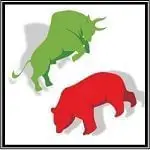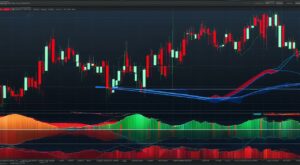Your cart is currently empty!
Is Leverage Gambling in Islamic Forex Trading? | An Ethical Perspective

Affiliate Disclaimer: This post may contain affiliate link or links
Investing in Forex is no foreign concept; however, the notion of doing so within the bounds of Islamic Finance poses unique considerations.
Unlocking potential profits in Islamic forex trading involves skill, not luck. Leverage isn’t gambling; it’s a strategic tool, aligning with Sharia principles for calculated risk. Explore ethical financial growth with Islamic Forex and leverage wisely.
Contents
Is Leverage Gambling in Islamic Forex Trading?
The prime focus is often on Halal investing or in other words, ensuring the entire financial operation is compliant with the Shariah compliance.
But when it comes to “halal forex“, one question emerges above all: “Is leverage gambling in Islamic forex trading?”
By dissecting key concepts such as riba, maysir, and gharar that govern Islamic banking, we aim to provide clarity on the subject matter.
Explore the intriguing intersection of finance and faith as we unravel the question: Is leverage akin to gambling in Islamic forex trading? Uncover the ethical dimensions in this riveting exploration.

Understanding Islamic Forex Trading
At the core, Islamic Forex Trading is characterized by adherence to principles of Islamic finance.
This includes avoidance of riba (interest), maysir (gambling), and gharar (uncertainty) ensuring Shariah-compliance.
Conventional forex trading may allow future contracts, margin trading, and speculative practices; however, these are typically frowned upon in Islam due to associated uncertainties.
In step with Halal investing, forex trading is permissible in Islamic law.
As long as it involves the trading of underlying assets cunning currency pairs and the transaction is concluded at the time of the contract without any delay.
These caveats underpin ethical investing, where finance is not isolated from ethics and morality.

Leverage in Forex Trading
Leverage in forex trading is a tool that enables traders to magnify their exposure to the market with a smaller initial deposit or margin trading.
It is a double-edged sword, amplifying both profits and losses.
For investors venturing into day trading or swing trading, leveraging can provide the benefit of potentially higher returns.
However, it may lead to overtrading and excessive risk, particularly if not guided by risk management and money management strategies.
The table below the Pros and Cons of leverage in forex trading.
| Pros of Leverage in Forex TradingCons of Leverage in Forex Trading | |
|---|---|
| 1. Increased Profit Potential: Leverage enables traders to open large positions with a small deposit, increasing profit potential. | 1. Amplified losses: While you can increase your profit potential, you can also amplify your potential losses. |
| 2. Greater Market Accessibility: Leverage allows traders to participate in markets they may otherwise not be able to afford. | 2. Risk of Margin Call: If the market performance isn’t as expected, traders may face a margin call and must fund their account to cover the losses. |
| 3. Diversification: Leverage can give traders the ability to diversify their portfolio by opening several positions at once without having to invest large sums of money. | 3. Overtrading: Greater access can lead to overtrading and excessive risk-taking. |
| 4. Hedging: Leverage allows for hedging strategies where one position offsets the risk of another. | 4. High Interest Rates Risk: Over time, high leverage can lead to significant interest charges, particularly for overnight positions. |
| 5. Allows for Short Selling: Traders are able to profit from both rising and falling markets using leverage. | 5. Increased Stress: Leveraged trading can be stressful due to the high risk involved and potential rapid losses. |
| 6. Capital Efficiency: Traders can maintain less capital in their account and use it more efficiently. | 6. Potential for Poor Money Management: Traders may ignore proper risk management due to the allure of potential high returns. |

Leverage: A Tool or Gambling
Debates have emerged around the ethical implications of using leverage in forex trading. Does it act as a financial advantage, or is it a form of gambling, aligning with the concept of maysir and gharar?
Inevitably, the answer lies in the interpretation.
Critics point towards practices such as speculation, short selling, and hedging, describing them as forms of gambling due to their inherent risks.
They argue it can succumb greed over patience, a potential downfall for permitted finance.
| Leverage as a Tool | Leverage as Gambling |
|---|---|
| 1. Strategic Tool: Leverage can be used as an important trading strategy by professional traders to maximize profits. | 1. Risk Abound: Like gambling, leverage can potentially lead to large losses. |
| 2. Risk Management: Leverage is used in conjunction with risk management strategies reducing the likelihood of severe losses. | 2. Uncontrolled Risk: Without effective risk management, leverage can result in high losses. This is similar to gambling, where outcomes are uncertain and losses can be high. |
| 3. Structured Approach: Profit or loss from leverage depends on the trader’s knowledge and understanding of the market, not luck. | 3. Chance Dependent: Like gambling, leverage can sometimes depend on unpredictable market changes or on “luck”. |
| 4. Capital Efficiency: Leverage allows small capital to handle large positions, thus using the available capital efficiently. | 4. More Loss Than Win: In an unpredictable market, the use of leverage may result in losing more than the initial bet, similar to gambling. |
| 5. Diversification: Balances risk by allowing investment in different assets or markets simultaneously. | 5. Addictive: Like gambling, high potential returns make leverage addictive, promoting overtrading. |
| 6. Regulated: Unlike gambling, leverage in the forex markets is heavily regulated to protect investors. | 6. Unrealistic Expectations: Just as gamblers hope for the big win, leveraging can often lead to unrealistic expectations. |

Leverage in Islamic Forex Trading
Leverage is permitted in Islamic finance and therefore, Islamic forex trading, as long as the leverage is not used for future trading or options trading, which would create uncertainties (gharar).
However, as long as it does not involve riba, the exchange takes place on the spot, and there is Sukuk or asset backing, it is permissible.
Thus, leverage becomes a matter of Islamic banking versus conventional interest-based trading.
Ethical Investing and Leverage
A practice that parallels ethical investing and Islamic finance is socially responsible investing. It promotes the idea of generating profits while adhering to ethical standards.
Taking advantage of leverage to earn higher returns can be socially responsible or ethical if used responsibly.
What distinguishes ethical use of leverage from gambling is the adherence to risk and money management strategies.
Following these strategies requires transparency, patience, and strong financial education.

Islamic Principles in Forex Trading
Key principles govern Islamic Forex trading such as Mudarabah (Profit sharing), Murabaha (cost-plus financing), and Musawamah (bargaining without revealing cost).
Sukuk(Islamic bonds) is a significant instrument of Islamic finance, acting as a bridge to connect the traditional market with the Halal one.
Investing in commodities like gold trading, silver trading, and equity trading must comply with these principles as well, to be classified as Halal Investing.
| Islamic PrinciplesDescription in Forex Trading | |
|---|---|
| 1. Riba (Interest) | Any form of interest is prohibited in Islamic Forex Trading. Therefore, interest-free accounts or swap-free accounts are offered to Muslim traders. |
| 2. Maysir (Gambling) | Gambling and extreme uncertainty are seen as unethical in Islam. Therefore, Islamic Forex trading is limited to spot trading, where delivery occurs immediately or within a permissible time frame. |
| 3. Gharar (Uncertainty) | Unclear or ambiguous transactions are not permissible in Islamic Forex Trading. Any kind of sale or purchase in Forex trading should be clear and well-defined to both parties. |
| 4. Mudarabah (Profit Sharing) | The principle of Mudarabah implies that profits should be shared amongst parties in pre-agreed ratios, promoting a fair and equitable system of distribution. |
| 5. Murabaha (Cost-Plus Financing) | This principle suggests that selling price should be the cost plus a known profit margin agreed upon by both parties. This provides transparency in Forex trading fees and charges. |
| 6. Musawamah (Bargaining) | Musawamah allows for bargaining and negotiations in transactions, contributing to a trading environment where prices are determined by market forces. |
| 7. Sukuk (Islamic Bonds) | This principle promotes investments backed by real, tangible assets, offering an alternative to conventional interest-bearing securities. |
| 8. Prohibition of Haram Activities | All trading activities should not involve haram (prohibited) items as per Islamic law, such as alcohol, pork, etc. |
| 9. Risk Sharing | Islamic Forex trading encourages risk-sharing amongst the parties involved, instead of transferring all the risk to one party. |
| 10. Transparency | Islamic Forex trading should uphold the principle of transparency, honesty and promote the provision of all necessary and accurate information. |

Islamic Trading Instruments
Islamic finance has introduced unique trading instruments, such as Sukuk, for capital protection with asset backing. These instruments operate within the bounds of Islamic law and promote profit sharing rather than interest.
These principles prohibit excessive uncertainty (gharar) and gambling (maysir), emphasizing risk sharing instead of transferring the risk like financial derivatives in conventional markets.
| Islamic Trading InstrumentsDescription | |
|---|---|
| 1. Mudarabah | It’s an Islamic contract of partnership where one partner provides capital, and the other offers expertise and management. Profits are shared based on a pre-agreed ratio. |
| 2. Murabaha | It is a form of credit which enables customers to make a purchase without taking an interest-based loan. The bank buys an item and then sells it to the customer on a deferred basis. |
| 3. Musawamah | It’s a general kind of sale in which the price of the sold commodity is bargained between the seller and the buyer without any reference to the price paid or cost incurred by the former. |
| 4. Ijara | It’s an Islamic leasing agreement. The bank buys a property and then leases it to a customer for a fixed rental payment. The property’s title remains in the bank’s name until the loan has been fully paid. |
| 5. Sukuk | Often described as “Islamic Bonds,” Sukuk are financial certificates developed as an alternative to conventional bonds. They comply with Islamic law that prohibits interest charges. |
| 6. Musharaka | This is an investment partnership where profits are shared as per pre-agreed ratios, whereas losses are shared in proportion to the capital or investment. |
| 7. Salam | It’s a forward contract where advance payment is made, and goods are delivered in the future. There is no specification of time in these contracts. |
| 8. Istisna | This is a contractual agreement for manufacturing goods, where commodities are sold before they come into existence, which is suitable for construction and farming projects. |
| 9. Takaful | It’s an Islamic insurance concept where members contribute money into a pool system to guarantee each other against loss or damage. |
| 10. Wakalah | It’s an agency contract. The investor (muwakkil) appoints an agent (wakeel) to invest on their behalf in a sharia-compliant manner. The agent is paid a fee for the services. |
Scholarly Opinions
Scholars have varying opinions on the use of leverage in Islamic Forex trading due to its complexities. However, the consensus revolves around the idea of “faith-based investing“.
Usage of leverage is considered Halal if it aligns with the principles of Islamic finance and devoid of riba and gharar.
Thus, scholars emphasize trustworthiness as a significant quality for traders dealing with Islamic Markets.

Conclusion
Conclusively, leverage itself is not haram (sinful) but how we put it into use can contravene the boundaries set by the Shariah.
Thus, whether or not leverage can be considered gambling in Islamic forex trading comes down to the individual’s intent behind engaging with this tool.
Remember that community well-being, moderation, and authentic Hadeeth underline Islamic finance. The goal is for these transactions to benefit the community and contribute to socioeconomic equality at large.
Additional Resources
For further in-depth knowledge, consider resources such as the AAOIFI Shariah Standard on currencies, available in multiple languages, for thorough understanding.
Consultation with an Islamic scholar, especially for complex matters like financial derivatives, is also advised.
Undoubtedly, the world of Islamic finance is fascinating. It combines the world of finance with moral values, paving the way towards truly ethical investing.
Download Non-repaint Harmonic Pattern Indicator
Other related articles
- Trade Report Indicator: Indicator for Forex Traders
- Trend Profiteer Trading System: A Trader’s Must Have
- Quantum Trend Sniper Indicator MT4: Free Download
- German Sniper Indicator: Unveiling its Power
- Mastering MACD Intraday Trend | Indicator Free Download
- Crazy Accurate 5-Days Breakout Strategy: Unlock Success

Joseph Benson, I have been trading forex for more than 15 years now and I am still trading actively, a content writer, an Architect also SEO expert, learn how to trade easily with me.










Leave a Reply